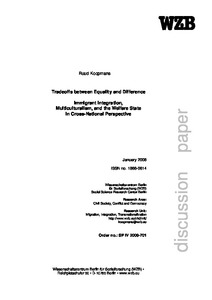Tradeoffs between equality and difference. Immgrant integration, multiculturalism, and the welfare state in cross-national perspective
"This paper investigates how integration policies and welfare state regimes have affected the socio-economic integration of immigrants, focusing on eight European countries: Germany, France, the United Kingdom, the Netherlands, Switzerland, Sweden, Austria, and Belgium. It presents comparative...
| Main Author: | |
|---|---|
| Institution: | ETUI-European Trade Union Institute |
| Format: | TEXT |
| Language: | German |
| Published: |
Berlin
2008
WZB |
| Subjects: | |
| Online Access: | https://www.labourline.org/KENTIKA-19291096124910192789-Tradeoffs-between-equality-and.htm |
| Summary: | "This paper investigates how integration policies and welfare state regimes have affected the socio-economic integration of immigrants, focusing on eight European countries: Germany, France, the United Kingdom, the Netherlands, Switzerland, Sweden, Austria, and Belgium. It presents comparative data on integration policies and welfare states regimes. The expectations derived from this comparative policy analysis are tested with cross-national data on integration outcomes regarding labour market participation, spatial segregation, and incarceration. The results suggest that multicultural policies, which grant immigrants easy access to equal rights and do not provide strong incentives for host country language acquisition and interethnic contacts, when combined with a generous welfare state, have produced low levels of labour market participation, high levels of segregation, and a strong overrepresentation of immigrants among those convicted for criminal behaviour. Sweden, Belgium, and the Netherlands, which have combined multicultural policies with a strong welfare state, display relatively poor integration outcomes. Countries that either had more restrictive or assimilationist integration policies (Germany, Austria, Switzerland, France) or a relatively lean welfare state (the United Kingdom) have achieved better integration results. These differences are highly consistent across the three domains of integration that are examined, with the exception of segregation rates in the United Kingdom." |
|---|---|
| Physical Description: | 30 p. Digital |

